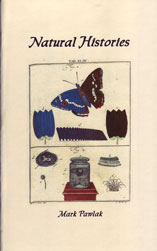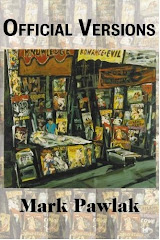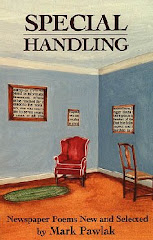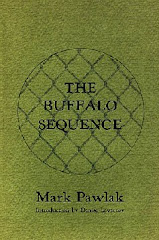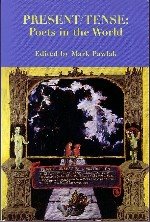Originally
published in 2002 in Gulfstreaming, the nline magazine of the Florida International University MFA program, but no longer archived @
http://www.fiu.edu/~gulfstrm/
Blah, Blah, Blah, Blah...Ahum, Ahum, Ahum:
Editing Hanging
Loose Magazine
by Mark Pawlak 2012
upate
I read poetry daily from force of habit much as every day I
read my two newspapers--first The New York Times, then the Boston Globe. Some
of it is for my own pleasure and instruction, but the major portion, far and
away, consists of poetry submissions to Hanging Loose magazine, where I have
been an editor for more than thirty
years (Bob Hershon, Dick Lourie, and Ron Schreiber were the other members of the
quartet until Schreiber’s death in 2004. Since then Donna Brook and Marie
carter have joind us as associate editors).
A few dozen manuscripts pass through my hands each week,
typically with between 3 and 10 poems of varying lengths. There's prose too,
but less of it, since Hanging Loose is primarily a poetry magazine. At any
given time there are two or more large, brown #5 Jiffy Bags stuffed with manuscripts lying about on
tables and chairs in my house, or stacked on a desk in my office at the
university (where I earn a living teaching mathematics), and I always carry one
in my backpack for reading on the bus and subway rides to and from work.
Reading submissions can be tedious work if there is a run
of days when the manuscripts are consistently mediocre, conventional,
unimaginative... or worse, greeting card verse and its close cousins. At such
times, I ask myself what perverse pleasure am I taking from this exercise. It's
certainly not delight in the language. Instruction by negative example quickly
becomes repetitive, and I sometimes worry that it has had a numbing effect on
my own poetry.
That's the downside. The upside is that most weeks
manuscripts arrive that are of genuine interest, if not exciting, consisting of
poems I'm eager to pass along to my co-editors: well-crafted poems that have
something to say, and are, more often than not, formally inventive. Not every
manuscript I send on is flawless, but if the work exhibits real emotional
energy and vigorous language then I feel it deserves consideration. Whether I
send work on because I like it personally or because I think it will be of interest
to one of the other editors is part of our collective process in which we all
have a lot of confidence in the others' judgment.
Some weeks there woud be an envelope from the Poet Laureate
of Tulare County, California, Wilma Elizabeth McDaniel, whose poems arrive
written out longhand on scraps of paper, re-used envelopes, and the blank sides
of her church newsletter. They were poems about dust-bowl-Oklahoma-1932, or
contemporary portraits of her San Fernando Valley farm-worker friends and
neighbors. Some weeks it wold be new poems from urbane Paul Violi--his latest
batch of wickedly funny, verbal pyrotechnics.
(Both Wilma and Paul are Hanging Loose regulars and sadly both have
pased away: Wilma in 2007 at age 88; Paul in 2011 at age 66). Other weeks there
are refreshing, insightful, emotionally honest poems from a teenage writer,
strong enough in language and execution to stand beside adult work. One time,
we received a first submission of poems and short prose from a 26 year old
Spokane/ Coeur d' Alene Indian named Sherman Alexie, who had found a copy of
Hanging Loose in his Washington State University library. His voice was
distinctive, his craft solid. We accepted some of the work and encouraged him
to send more, which he did. A lasting relationship was established, which has
resulted in four collections of poems and a screenplay, at last count, all
published by Hanging Loose Press, the book publication side of our enterprise.
(We began to publish books in 1975 out of a desire to give more space and a wider
audience to some of our regular magazine contributors. Over 187 titles now bear
the Hanging Loose Press imprint, and we're proud to say that we keep them all
in print.)
For an editor putting out a non-commercial, literary
magazine year after year, getting the likes of these in the mailbox is
recompense for the drudgery. It's what keeps me going. It assures me that I
have my fingers on a pulse of lively American writing. As a poet, the benefit
of reading strong, accomplished work is that it inspires and instructs me. It
challenges me to write new, better poems myself.
The mission of Hanging Loose has always been to recognize
and encourage good writing by publishing the best work available to us. We
emphasize the work of new writers and of older writers who deserve wider
recognition. In a sense, each issue is an informal symposium on what it is
possible to accomplish in poetry at the moment. We view the magazine as an
ongoing exchange among many different voices in which some writers participate
briefly, offer what they have to say, then exit the stage; others return year
after year keeping up their end of the conversation. Old friends reappear after
long absence, much as old friends are wont to do, and new voices are always
joining in, some of whom stay around. Among the ones who stay or keep coming
back are unmistakable voices that I never tire of hearing. What they have to
tell me, the things they observe or comment on, are always new, their insights
always fresh.
Roughly one-third of each issue is made up of work by poets
living in or near New York City, more by happenstance than by design. Some of
these authors are associated with The Poetrty Project at St. Mark's Church in
lower Manhattan. Hanging Loose's roots are in the New York poetry scene of the
'60s (the first issue appeared in 1966); over the years, we have built up and
maintained high visibility in the New York City area. But the Hanging Loose map
has push pins at locations spread across the country and beyond its shores,
anywhere one or more regular contributors have put down roots: Boston, rural
New Hampshire, Kansas (Lawrence & Salina), Michigan (Ann Arbor &
Detroit), California (San Francisco, San Cruz, Tulare), Washington
state(Spokane, Seattle), Scotland (Edinborough, Glasgow), Paris.
From the very first, when the magazine was loose
mimeographed pages collected inside an envelope (hence the name), each issue of
Hanging Loose has included art, so the exchange of ideas among creative artists
includes painters and photographers too. The covers of the first two issues,
for example, were by noted New York City artist Mimi Gross. These days, in
addition to the front and back covers, there is a portfolio of work by the same
artist inside. Most of the featured artists have been New Yorkers, which
highlights another unintentional aspect of HL: we follow in the tradition of friendship and collaboration between New
York painters and poets dating back to William Carlos Williams and the
Steiglitz circle, continuing with O’Hara, Ashbery, et al, and the New York
School painters of the 1950s. "BROADWAY: A Poets & Painters
Anthology," edited by James Schuyler and Charles North, and published by
Hanging Loose Press, lived up to its name.
In this country, new literary magazines are always starting
up. One issue is followed by the next for a period of time until they close
shop. Some last a single issue, some come out for one or two years, others keep
on going year after year--thirty-five years and counting for Hanging Loose.
Magazines published at universities are often long-lived due to institutional
support in the form of money, office space, secretarial help and the like. They
also benefit from infusions of new blood in the form of interns, editorial
assistants, and, from time to time, new managing editors. (This element of
turnover has its obvious advantages and drawbacks.) For independent literary
magazines it is often the commitment and dedication of a single editor or, as
at HL, a group of editors, that is responsible for its continuation. It becomes
a way of life. When the founding editor runs out of steam, or looses interest,
takes ill, or grows infirm, then the enterprise folds. A notable example was
the Wormwood Review, produced
single-handed by Marvin Malone, in its unadorned saddle-stitched format for 30
years. That for many years there were four of us to share the burdens and
responsibilities for running Hanging Loose is the principal reason for its
longevity. At those times when one of us is unable to pull his full weight for
whatever reason, the other three take up the slack, and, like an internal
combustion engine in need of a tune-up, the magazine has, nevertheless, kept
chugging along.
The way we go about selecting poems and stories from the
large volume of work that is sent to us is a routine that has been in place for
decades. It is a result of the fact that, except at the very beginning, the
editors have rarely all lived in the same citiy. For the better part of the
past twenty years, we have been concentrated in two places: New York and Boston
(or to be precise, Brooklyn and Cambridge). This has made it necessary to
circulate manuscripts by way of the US Postal Service and to keep track of
where each submission is at any given time by means of routing slips on which
the votes are recorded. (Collected afterward in binders, arranged on shelves in
Dick Lourie's basement, these routing slips are a paper record of the editorial
votes on individual poems and the final disposition of nearly every submission,
going back more than thirty years. )
Every week, as I mentioned, large, padded envelopes stuffed
with manuscripts arrive in my mail from Brooklyn, which has remained our
official address since almost the beginning. I read each one, record my votes
on individual poems -- yes, maybe, or no -- and then either reject the
manuscript (if my votes are all no's) or pass it on to the next editor with my
votes recorded on a "manuscript routing sheet." At any given time, I
have an envelope full of manuscripts on which I'm the first reader, and additional
envelopes sent to me by one of the other editors, on which I am second, third,
or fourth reader. This process of circulating manuscripts assures that any poem
that has received positive votes--yes or maybe--is eventually read by all the
editors, and that those we don't have any interest in are quickly returned.
Every manuscript we receive is read by at least one of the four editors.
The second and final phase of our selection process is
entirely different. Roughly every three months, we all convene on a weekend for
a marathon editorial meeting, in either New York or Boston. This is when we
make the decisions about which poems or stories to publish in the next issue.
At this meeting, sixty to seventy envelopes, the remainder of the hundreds of
manuscripts that have passed through our hands, now sit on a table in front of
us, arranged chronologically by date of receipt. And, now, crucially, we begin the selection process over again
from scratch. A previous "yes" or "maybe" vote guarantees
only that a poem or story will get to the table for this final hearing, which
is in effect de novo, a completely
new process. Previous votes are disregarded, their only function is to get the
work past a first screening. Each poem in contention is now read aloud by one
of the editors. Our final decision is based upon how successfully the work
comes across when taken in by way of the ear. We subscribe, in other words, to
Zukovsky 's measure of poetry (after Pound):
"the pleasure it affords as sight, sound, and intellection,"
with emphasis on the sound.
There is something about sitting around a table with three
other poet/editors for hours at a time focussed solely on listening to poems
read aloud that heightens one's acuity to language and imagery. The way any one
of us was originally disposed toward a given poem when he read it in the
privacy of his home or office may hold up during these meetings; but just as it
often does not. Each of us has found himself changing an opinion and reversing
an original vote after listening to poems read out loud. Sometimes real
surprises occur. There are occasions when a poem with four positive votes going
into the meeting gets turned down. Other poems, by contrast, come to the table with just one positive vote
and are accepted. What, in the first case, had appeared as virtues on the page,
didn't stand up to this degree of scrutiny; in the other case, close listening
revealed qualities that three of us had originally missed. And all of us have
grown expert in trying to "put across" via a terrific performance
some poem we favor that has not, on the face of it, excited our colleagues.
After reading each poem, we discuss its strengths and
weaknesses. Sometimes we pass the poem from one to another to further
scrutinize it on the page. Sometimes we choose to read it aloud again. Because
we respect one another's taste and judgment, we take the time to hear each
other out. Disagreements arise but are seldom intractable. It is more often the
case that one of us has had his heart set on a poem but the other three are
saying no. We don't strive for consensus
but are pleased when it happens. Our rule is that two nods equals an
acceptance, but we each reserve the right to veto a poem (though in the
magazine's long history the veto was exercised in only two instances.)
. When we talk about poems, we are not
inclined to use the formal terminology of literary criticism, perhaps
surprisingly given that two editors hold advanced degrees in literature and
poetry. We have, rather, over the years, evolved an informal way of discussing
the merits of poems and a system for ranking them. Scintillating language and
formal inventiveness are two things we look for. Poems that have a
reason to exist, that have something urgent to say and say it well, is our rule
of thumb. Pound's dictum here is as good a yardstick as any: "nothing you
could not say under stress of some emotion." We also pay close attention
to how the poem is put together, to how its elements function and cohere.
Williams' prescription that a poem be made "with
such intensity of perception that it lives with an intrinsic movement of its
own to verify its authenticity," is one we subscribe to.
Dick Lourie once characterized our
stance as this: the poem under examination for admission is guilty until proven
innocent. By this he meant that an editor's task is fundamentally different
from that of a teacher, whose job it is to encourage and look for promise, to
point out strengths and downplay weaknesses. The teacher can hold to the belief
that, with guidance, the poem will eventually succeed in its intentions. For us
as editors, the poem has to prove itself on the spot. When we turn poems down,
we do so for any number of reasons. Put simply, they haven't worked for us.
There is, often, nothing specific to point to that is wrong, nothing particular
we might suggest to the author to fix (not that we're in the habit of making
such suggestions to authors). "Not enough there" is the critical
category we use in such cases, meaning, the poem isn't fully realized; it hasn't
gone far enough or deep enough to explore what it set out to do. A problem of a
different sort that we frequently encounter has to do with the fact that a
surprising number of poets today don't understand how to properly do line
breaks. We often have to ignore the author's scoring in order to put the poem
across when reading it aloud. Sometimes, but not always, that's because it is
really chopped-up prose being cast as verse. When we encountere several
infractions of this kind in a single long day of sitting around the table
reading, an exasperated Ron Schreiber would quote from memory key passages of
Denise Levertov's definitive essay "On the Function of the Line."
When writers inquire about what kind
of poems we are looking for HL or ask me if we favor certain themes, I'm
inclined to reply: "Send us
the kind of work we like to publish."
Although my response may sound flippant, it is meant seriously: I mean
by it that you should read an issue or two of HL to sample the kind and range
of work we publish, then decide for yourself if what you have to offer will fit
in--or, as Bob Hershon has put it, the past is precedent. Most of the poems we publish are short, a single page or
less in length. There are several reasons for this, not the least of which is
that few poems come our way that are able to sustain their verbal energy beyond
one page. There have, however, been notable exceptions of substantial length
published in Hanging Loose over the years. Our preference is for poems
that are concrete rather than abstract; poems that are particular rather than
general; poems whose language is conversational rather than formal or stylized.
Rhymed, metrical verse is also unlikely to find a place in our pages (with some
notable exceptions); the poems we publish tend to be in open or organic forms.
Poetry that takes itself too seriously doesn't fare well with us either; and,
if the work exudes the musty smell of library stacks, we'll say, "no
thanks. "
We favor poems that demonstrate an emotional justification for their
existence rather than poems whose appeal is primarily or wholly intellectual or
linguistic. If it was written for a classroom exercise (yes we can tell)
or to show off the author's facility, we're more than likely to say no. Such
poems have a distinctive signature of being
carefully, even expertly crafted, but they do not convince us that their
authors needed to write them. They come across to us, rather, as creative writing assignments-- write a sestina, write a
sonnet in the style of Ted Berrigan; or they suggest a learned discipline that
is disconnected from the felt life and experience of the poet--sit down and
write a poem a day, write for one hour each morning after rising.
No thanks is also our response to pop lyrics, hastily
written work with glaring errors, obvious imitations of well-known poems, vague
generalizations about Love and Life, poems stuffed with clichés and tired
language, and poems that are so private that the reader cannot decipher them.
Hanging Loose
poems are written by a multigenerational lot, ranging from Harrevy Shapiro, I his
late 80s, to the remarkable teen-age poets who appear in every issue, some of
whom have gone on to establish careers as writers. Our collective taste is
eclectic in both content and style, as reading any issue will bear up. We have
never published a thematic issue, and we pride ourselves in never having felt
the need to publish a gay or women's or Asian-American issue because those
writers have always appeared in our pages. From time to time, we turn over a
section of the magazine to a guest editor. Denise Levertov, in her capacity as contributing editor for
many years, edited supplements
consisting of work by those she found to be exciting new talents. We don't
solicit work by established big name writers, but we are always happy to
consider their work when they choose to send it to us
And so the poems
keep arriving with each day's mail delivery. They get read, passed around,
discussed; votes are taken, yea or nay. Week after month after year, as Bob
Hershon has captured the experience, the four of us keep on keeping on.
THE EDITORS EDITING
By
Robert Hershon
Nomi our neighbor
Asks Donna what are those
Guys doing out back
Sitting around the table
Table full of papers
And one guy goes blah blah blah
blah
And the others all shake their
heads
And go ahum ahum ahum
Then the oaks leaves fall
Then the white garden furniture
Covered with gray city snow
Bluejay walks across the table
And down somebody's leg
Blah blah blah blah

